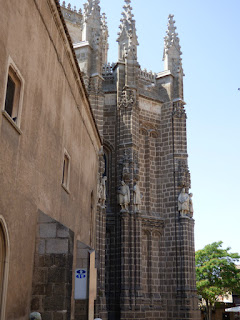Being surrounded by the Tagus river made Toledo easily defensible as you can pretty much only approach via bridges. The Medieval Puente de San Martin is one of the prettiest; its towers date from the 16th century.
It's chief claim to fame is an enormous (11.5 feet by 15 feet) painting of the Burial of the Count of Orgaz, widely considered to be one of the finest works of El Greco, with Saints Stephen and Augustine themselves descending from heaven to bury him with their own hands. no photographs are permitted, so I shamelessly abstracted this image from somewhere on the internet...
Monasterio de San Juan de Los Reyes from the San Martin Bridge:
The ayunamiento, across from the Cathedral, makes a pretty attractive town hall
The Cathedral itself is hemmed in by other buildings, so tough to photograph from the outside, but lovely inside. A 13th-century High Gothic, begun by a French architect and followed by at least two others, since it took so long to construct.
Corpus Christi celebrations kept us from being able to go inside, but I have to say the decoration for the event was spectacular
No shortage of other churches in Toledo, however. Here's El Salvador Church
The Elizabethan-style Monasterio de San Juan de Los Reyes, founded by King Ferdinand and Queen Isabella to commemorate the birth of their son. It was built between 1477 and 1504, badly damaged by Napoleon, and restored between 1883 and 1967 (these things take time...)
On the exterior hang the manacles and shackles of Spanish prisoners of war from Granada who were liberated during the Reconquest
14th century Mudejar-style Santo Tome Church
It's chief claim to fame is an enormous (11.5 feet by 15 feet) painting of the Burial of the Count of Orgaz, widely considered to be one of the finest works of El Greco, with Saints Stephen and Augustine themselves descending from heaven to bury him with their own hands. no photographs are permitted, so I shamelessly abstracted this image from somewhere on the internet...


























No comments:
Post a Comment